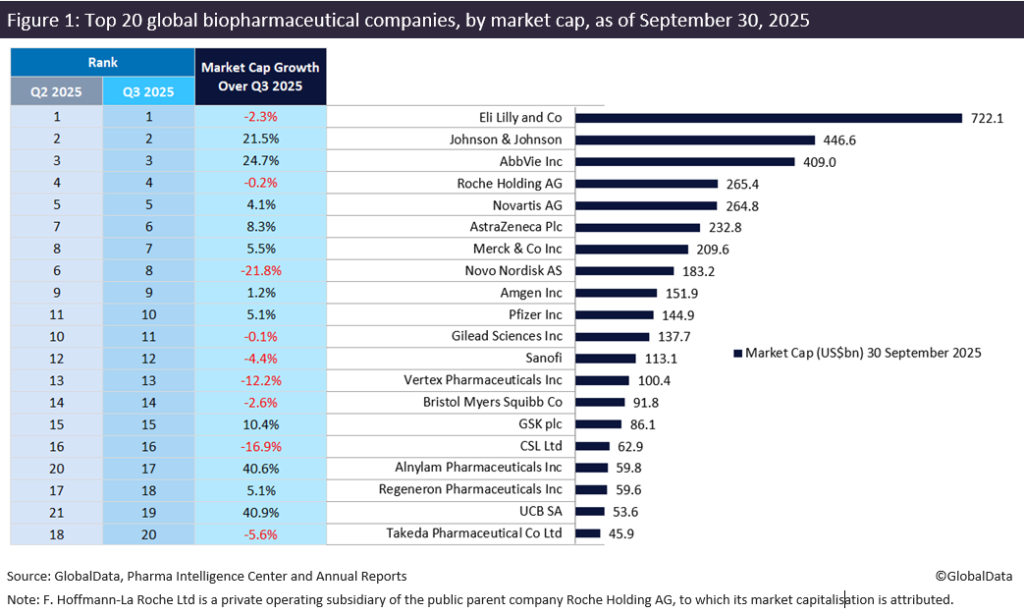Top 20 biopharma companies Q3 2025 market cap up 4% despite headwinds
The top 20 global biopharmaceutical companies experienced mixed performances in their individual market capitalisations in the third quarter (Q3) of 2025, amid headwinds from US President Donald Trump’s tariffs and drug pricing pressures, with companies that demonstrated robust pipeline development reaping success. As a result, their combined market capitalisation rose 4% from $3.7 trillion (trn) on 30 June 2025 to $3.8trn on 30 September 2025, according to GlobalData, a leading data analytics and research company.

Belgian biopharmaceutical company UCB reported the largest market capitalisation growth, at 40.9% to $59.8 billion in Q3 2025, positioning the company as a new entrant in the top 20 players. The company’s growth was driven by its competitor drug, Moonlake Immunotherapeutics’ sonelokimab which achieved mixed results in its Phase III trials (VELA-1 and VELA-2), strengthening the market position of UCB’s Bimzelx (bimekizumab) in hidradenitis suppurativa (HS).
Go deeper with GlobalData

Access deeper industry intelligence
Experience unmatched clarity with a single platform that combines unique data, AI, and human expertise.
Alnylam Pharmaceuticals recorded a market capitalisation growth of 40.6% in Q3 2025 due to the strong performance of its RNA interference (RNAi) therapeutic Amvuttra (vutrisiran) for transthyretin amyloidosis cardiomyopathy (ATTR-CM) and hereditary transthyretin amyloidosis with polyneuropathy (hATTR PN), with a 59% quarter-on-quarter (QoQ) increase in global sales to $492 million in Q2 2025. The European Union’s approval of Amvuttra for ATTR-CM in June 2025 further fuelled the company’s growth, contributing to its analyst consensus forecasted global sales of $7.4 billion by 2031, according to GlobalData’s Sales and Forecast database.
AbbVie reported a 24.7% increase in market capitalisation in Q3 2025, driven by the completion of its $2.1 billion acquisition of Capstan Therapeutics in August 2025, including Capstan’s proprietary RNA delivery platform and its lead drug CPTX2309 — a Phase I chimeric antigen receptor (CAR) T-cell therapy developed for autoimmune disorders. AbbVie’s growth was further fuelled by its plans to invest $195m into an active pharmaceutical ingredient (API) manufacturing facility in North Chicago – a strategic move to expand its manufacturing capacity in the US to mitigate the impact of Trump’s tariffs.
Johnson & Johnson saw a 21.5% market capitalisation growth attributed to its 5.8% sales growth reported in Q2 earnings, as well as robust pipeline progress, including US Food and Drugs Administration (FDA) approval of its monoclonal antibody Tremfya (guselkumab) for paediatric patients with plaque psoriasis and active psoriatic arthritis in September 2025. The recent FDA approval of Tremfya builds upon its current approvals in adult plaque psoriasis, psoriatic arthritis, ulcerative colitis, and Crohn’s disease. Tremfya is forecasted to achieve drug analyst consensus global forecast sales of $9.2 billion by 2031, according to GlobalData’s sales and forecast database.
Novo Nordisk moved down the list by two places with a 21.8% market capitalisation decline after the company lowered its sales and operating profit forecasts, citing reduced US demand for its obesity and diabetes drugs Wegovy (semaglutide) and Ozempic (semaglutide) amid increasing competition from Eli Lilly’s Mounjaro (tirzepatide) and Zepbound (tirzepatide), as well as compounded GLP-1 agonists. CSL’s market capitalisation fell 16.9% due to diminishing demand for its ‘flu vaccines and investor skepticism over its restructuring plans, including laying off 15% of its workforce and spinning off its Seqirus influenza vaccine business.

Don’t let policy changes catch you off guard. Stay proactive with real-time data and expert analysis.
By GlobalDataVertex reported a 12.2% decline in market capitalisation in Q3 after its oral NaV1.8 pain signal inhibitor, VX-993, failed to meet its primary endpoint in the Phase II study for acute pain following bunion surgery. Simultaneously, Vertex disclosed that the FDA had conveyed that it would not grant the company’s marketed pain therapy Journavx (suzetrigine) expanded approval in general chronic neuropathic pain, which further contributed to the company’s market capitalisation decline.
Investor sentiment in the biopharmaceutical sector has been impacted by Trump’s ongoing tariffs and executive orders on a “most favoured nation” pricing model, which aims to align US drug prices with those in other developed countries. Despite these challenges, industry leaders that continue to drive innovation through advancing research and development programmes or engaging in strategic investments, such as mergers and acquisitions and manufacturing expansions — will be better positioned for long-term growth.
Free Buyers Guide
Leading Guide to Pharmaceutical Wholesalers for the Pharmaceutical Industry
Thank you.
Your download email will arrive shortly. Please check your mail inbox to download the buyer's guide
You may also be interested in:
By downloading this Buyers Guide, you acknowledge that GlobalData UK Limited may share your information with our partners/sponsors who may contact you directly with information on their products and services.
Content Original Link:
" target="_blank">








































































